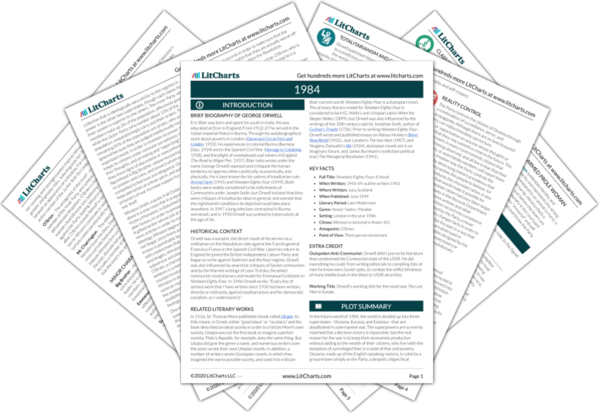Summary
Analysis
After weeks of further torture, O'Brien tells Winston that there are three stages—learning, understanding, and acceptance—and that he is about to enter upon the second stage. He tells Winston that he, O'Brien, is one of several authors of the book he told Winston was written by Emmanuel Goldstein. He says that the Party can never be overthrown and that the idea of a proletarian rebellion is nonsense. He asks Winston if he knows why the Party wants power.
"Learning" is the discovery that the Party has absolute power over you. "Understanding" is that there is no hope for anyone. O'Brien eliminates Winston's hopes, revealing that Emmanuel Goldstein and the book Goldstein supposedly wrote are fakes, and mocking the chances of a prole revolution.
Themes
Trying to say what he thinks O'Brien wants to hear, Winston replies that the Party seeks power for the good of the majority. O'Brien shocks him for this answer, and tells him that the Party seeks power for power's sake—absolute power over all individuals, so that they are nothing unless they merge themselves with the Party. Winston responds that the Party can't control physics, such as the movement of the stars. O'Brien retorts that because the Party controls the mind, it controls all reality. "If you want a picture of the future, imagine a boot stamping on a human face—forever."
Winston thinks that O'Brien sees himself and the Party as forces of good. But O'Brien doesn't care at all about being good–he and the Party just want power, and they want it forever. O'Brien further claims that by controlling people's thoughts and feelings, the Party doesn't just control people's perceptions of reality. It actually controls reality.
Themes
Winston insists that the spirit of Man will defeat the Party. O'Brien tells Winston that he is the last man and orders him to remove his clothes and look in the mirror. Winston does, and is horrified at his changed appearance—he is emaciated, partially bald, gray with dirt, scarred, and has lost nearly all of his teeth. O'Brien mocks him. Winston begins to weep.
O'Brien says that Winston has been completely beaten, broken, degraded. Winston protests that there is one degradation he has not suffered: he has not betrayed Julia. O'Brien agrees and Winston experiences a feeling of reverence toward O'Brien for admitting this fact. He asks O'Brien when they will shoot him. O'Brien answers that it may be a long time, because he is a difficult case, but not to give up hope—in the end he will be shot.
By not betraying Julia, Winston has himself held on to those pure things, spirit of man, that does make men capable of great things: love and loyalty. He has kept his human dignity, and asks when he will be shot because he knows that by dying without betraying Julia he will in some way have remained himself and defeated the Party.
Themes
Get the entire 1984 LitChart as a printable PDF.













